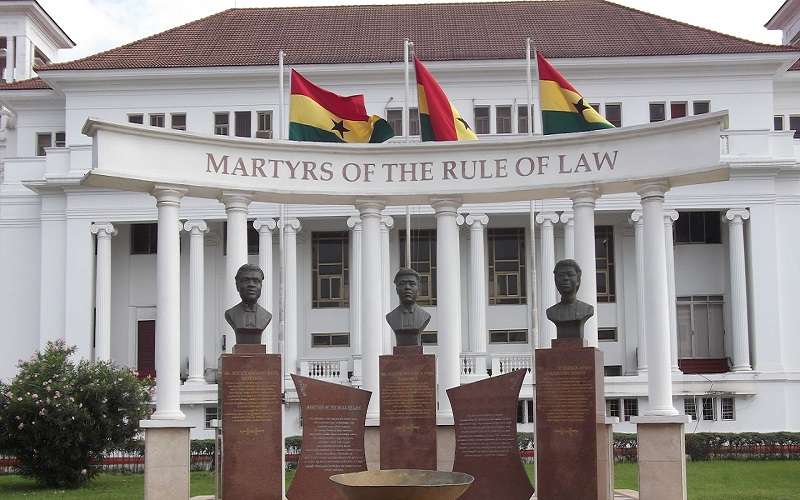Legal scholar and governance advocate Prof. Stephen Kwaku Asare has once again emphasized the urgent need for a fast justice system in Ghana.
He argued that delayed justice not only erodes public confidence in the judiciary but also fosters impunity and weakens democratic governance.
According to Prof. Asare, slow justice is a “silent killer” that suffocates accountability and denies citizens timely redress. “The truth is that justice delayed is justice denied, and a slow judicial system is a silent accomplice to injustice,” he stated.
He insisted that the legal system must transition toward speedier processes without compromising fairness.
“While Yaanom may characterize this as a radical call, it is nothing new. When J.A. Kufuor introduced the Fast Track Court, it was welcomed as a step toward timely justice delivery.
Yet today, advocating for system-wide fast justice meets unwarranted resistance. What is their fear?”
Prof. Stephen Kwaku Asare
According to Prof. Asare, Ghana faces an urgent need to address corruption-related cases promptly.

He pointed out that many citizens believe that national resources have been misappropriated, yet accountability remains elusive.
“Accountability demands that those who have looted public funds face justice, yet the current system, bogged down by endless adjournments and frivolous interlocutory appeals, is often weaponized to frustrate prosecutions.”
Prof. Stephen Kwaku Asare
Prof. Asare contended that a legal system plagued by excessive delays not only emboldens corruption but also undermines public trust.
As such, he warned that justice must be swift and decisive to restore confidence in governance and the rule of law.
Time Standards: The Engine of Fast Justice
Furthermore, Prof. Asare’s proposal centers on the establishment of judicial time standards designed to enhance efficiency and streamline court proceedings.
According to him, these time standards would serve as a structured framework, setting clear and enforceable expectations for the timely resolution of cases at both the trial and appellate court levels.
By implementing these standards, the reform seeks to address longstanding issues such as case backlogs and procedural inefficiencies that have plagued the judicial system.
Prof. Asare indicated that the goal is to ensure that justice is not delayed due to unnecessary bureaucratic hurdles, ultimately improving public confidence in the judiciary.

This initiative aims to create a more accountable and responsive legal system where cases are handled with greater urgency and transparency, reinforcing the principle that justice delayed is justice denied.
“Before critics dismiss time standards as impossible, let us remind them that such standards exist in many jurisdictions. Even here at home, we enforce strict timelines for presidential election petitions (PEP)—a recognition that some cases are too important to be left to indefinite delays. The same logic that justifies PEP timelines applies to this broader reform.
“A system that moves swiftly and predictably benefits not just individual litigants but the entire fabric of governance, ensuring that justice is neither a privilege nor a mirage, but a guaranteed right for all.”
Prof. Stephen Kwaku Asare
To improve efficiency within the judicial system, Prof. Asare proposed a structured timeline for different categories of legal proceedings to ensure cases are resolved within reasonable timeframes.
He recommended that trial courts follow specific timelines for criminal cases. Misdemeanors should be concluded within six months from the date of arraignment, felonies within twelve months, and capital offenses within twenty-four months.
In civil cases, he emphasized that simple claims, such as debt recovery and landlord-tenant disputes, should be resolved within six months.
General civil cases, including contract disputes and tort claims, must be completed within twelve months, while complex civil litigation, such as class actions and corporate disputes, should not exceed twenty-four months.
For family law cases, Prof. Asare proposed that uncontested divorces and maintenance matters be settled within six months, while contested divorces and child custody cases require up to twelve months. Adoption cases should be concluded within nine months.
Regarding election petitions, he stressed the need for expedited resolution. Presidential election disputes should be determined within twenty-one days, while parliamentary election petitions must be settled within sixty days to ensure swift electoral justice.
In appellate courts, he outlined strict timelines for handling appeals from trial court decisions. Civil and criminal appeals should be finalized within six months, while fast-tracked appeals, such as election-related disputes, must be resolved within one month.
For Supreme Court cases, he stated that matters under original jurisdiction, particularly constitutional cases, must be adjudicated within twelve months.
Prof. Asare recommended that appeals to the Supreme Court should be completed within nine months, and requests for a review of a Supreme Court decision must be determined within ninety days.
Additionally, interlocutory appeals will be restricted to cases involving fundamental breaches of jurisdiction or natural justice.
These appeals must be resolved within thirty days to prevent unnecessary delays in judicial proceedings.
Additionally, courts will eliminate automatic stays of proceedings triggered by such appeals, ensuring that litigation moves forward without undue obstruction.
Ensuring Accountability: The OMAMPAM System
Moreover, Prof. Stephen Asare proposed the implementation of the OMAMPAM system, an automated judicial tracking platform aimed at promoting fairness and judicial independence.
He explained that this system would enable citizens to monitor the progress of cases, helping to expose systemic delays within the judiciary.
Additionally, the system would require judges to provide clear justifications for case adjournments, ensuring greater accountability in judicial proceedings.
It would also place strict limitations on interlocutory appeals that are often used as delay tactics, preventing unnecessary disruptions to the legal process.

To further enhance efficiency, the OMAMPAM system would mandate the automatic scheduling of overdue cases for expedited hearings, ensuring that long-pending matters receive prompt attention and resolution.
“The case backlog remains a major challenge in Ghana’s judiciary. Under this reform, Court vacations will be canceled, though judges will still be entitled to their usual leave; A system-wide court shutdown will be a thing of the past, ensuring continuous case movement”.
Prof. Stephen Kwaku Asare
Accordingly, Prof. Asare emphasized that for these judicial reforms to be effective, both judges and litigants must be held accountable for ensuring timely case resolution.
He proposed several measures to enforce this accountability, including sanctions for unjustified delays, which could involve disciplinary actions against those responsible for obstructing the judicial process.
Additionally, he recommended imposing cost penalties on frivolous appeals to deter the misuse of the legal system and prevent unnecessary congestion in the courts.
To maintain efficiency, he called for regular reviews of time standards to ensure they remain adaptable to evolving judicial needs and challenges.
Beyond procedural reforms, he stressed the importance of investing in judicial infrastructure.
A well-functioning justice system, he argued, requires digital case management systems to streamline court processes, continuous training for judges to enhance their efficiency, and the expansion of alternative dispute resolution mechanisms to reduce the burden on traditional courts.
Prof. Asare concluded by underscoring the urgency of swift justice, asserting that “fairness and efficiency are not mutually exclusive.”
He warned that slow justice is not merely a delay but a denial of justice itself, reducing it to something cold and lifeless.
He urged the judiciary to embrace a faster, more responsive system to restore public confidence and uphold the true essence of justice.
READ ALSO: IMF Credit Facility Review Set for April 2025 as Staff Completes Ghana Visit





















